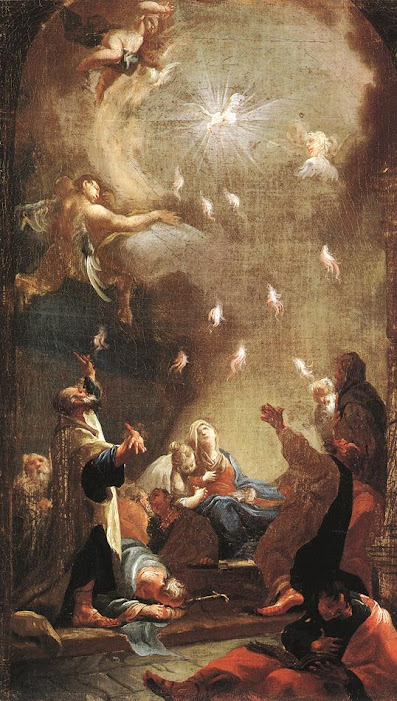I have come to set the earth on fire,
and how I wish it were already blazing!
There is a baptism with which I must be baptized,
and how great is my anguish until it is accomplished!
This was not the sort of fire James and John thought to call down upon the Samaritan village that rejected Jesus. This was the fire of the baptism of the Holy Spirit.
John answered them all, "I baptize you with water. But one who is more powerful than I will come, the straps of whose sandals I am not worthy to untie. He will baptize you with the Holy Spirit and fire" (see Luke 3:15).
For us the baptism in the Holy Spirit would mean a participation in the death of Jesus so that his risen life could be manifested in us (see Romans 6:3-4). For Jesus, then, there was not only the baptism of water with which he united himself to sinners, there was also the baptism of blood, the cross itself, from which the efficacy of all baptism derived, and which itself unlocked the gift of the Holy Spirit as living water poured forth from the side of Christ (see John 7:38-39).
This is he who came by water and blood—Jesus Christ; not by the water only but by the water and the blood (see First John 5:6).
As Simeon prophesied when Jesus was presented in the temple, the child was to be a sign that would be contradicted (see Luke 2:34). By preferring nothing to the will of his Father, Jesus himself would for that very reason be divisive, separating sheep from goats, those who would prefer nothing to the love of God from those who preferred love of anything less, all of which is in some fashion love of self. Even the greatest natural goods, including the best natural basis for unity, the family, must now take a second place to Christ. As a consequence, just as Jesus himself was willing to accept "opposition from sinners" his followers must also be ready to accept division, persecution, and opposition for his sake.
It was precisely accepting no substitute to the primacy of God's will that provided the basis for true and lasting unity. For the division of which Jesus spoke indeed his goal, as he said, but it was not the end goal. Jesus sought to draw all people to himself. But he left us with a frightening scope of freedom with which to respond. Yet only on this basis, allowing for the freedom of each individual to respond to him, could there be true "peace on earth". He would not merely sweep real issues under the rug so that people could have a superficial peace, a peace that could never last. True peace could be found in him alone, and he offered that peace to any who would receive it.
We must keep our eyes fixed on Jesus so that we too can have the endurance necessary to run our own race. Focusing on Jesus gives us inspiration, but more than that, it gives us the grace to believe that he will empower us to do what he himself first did. We will encounter situations that are so difficult as to make us want to slow down or give up. But if we see how compelling the joy that lay before Jesus was for he himself we can become convinced that such joy is worthy of pursuit for us as well. We will then be able to experience challenges, whether from within or without, as opportunities for the purifying fire of the Holy Spirit to remove from us "every burden and sin" that is any event only slowing us down. Then we will be able to, as Saint Benedict wrote, "with hearts enlarged and unspeakable sweetness of love run in the way of God’s commandments" (see Rule of Saint Benedict, Prologue). If we take our eyes off of Jesus we will quickly come to believe that the race is not worth it or not possible. We will feel like Jeremiah in the pit, sinking in the mud. But if we have let the focus of our gaze slip let us cry out for help, such as Jeremiah found, such as the psalmist testified that God himself is always ready to supply.
The LORD heard my cry.
He drew me out of the pit of destruction,
out of the mud of the swamp;
he set my feet upon a crag;
he made firm my steps.

No comments:
Post a Comment